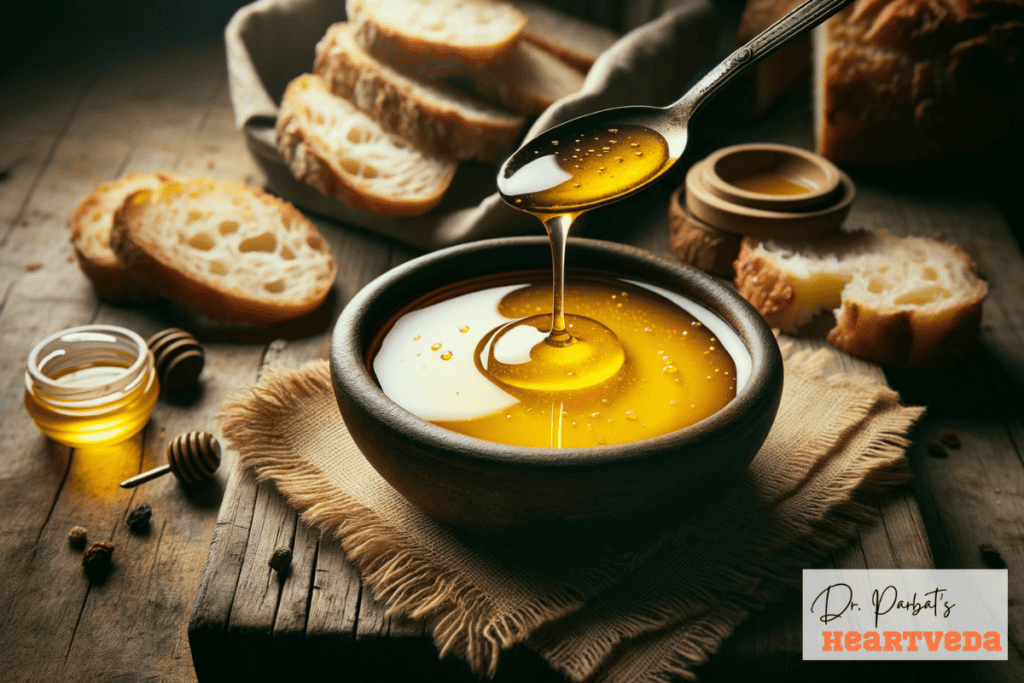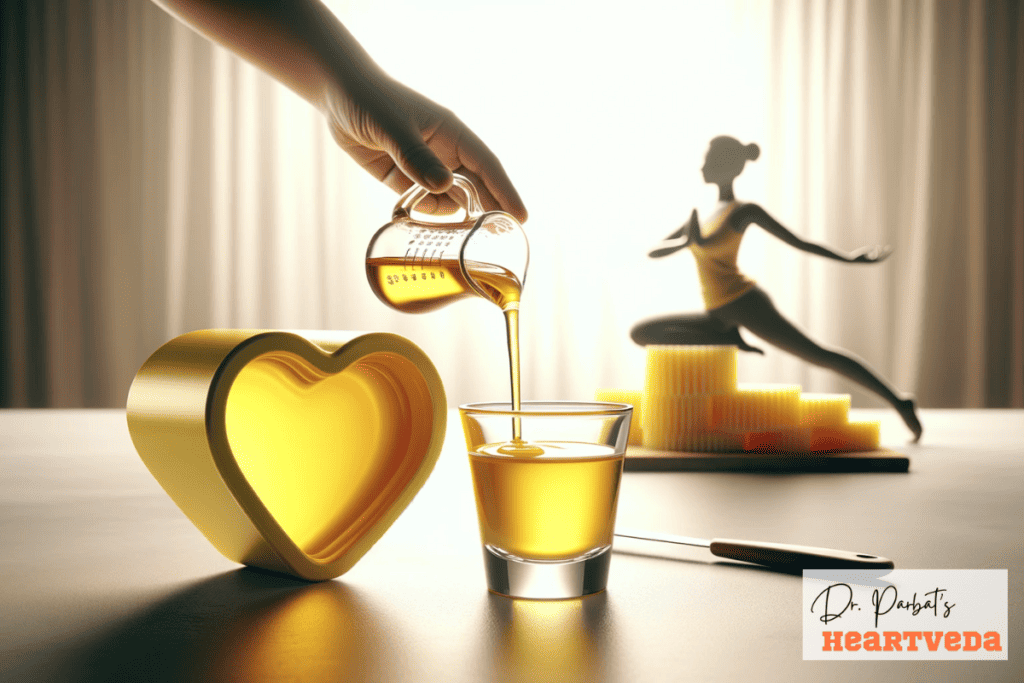
If you’ve ever wondered about the cholesterol content in Indian clarified butter, commonly known as ghee, you’re not alone. Ghee’s rich flavor and nutritional qualifications make it a staple in many kitchens. However, amidst the praise for its health benefits, questions about its impact on heart health frequently arise. Dive into the facts revealing that ghee contains HDL cholesterol — the “good” type that is said to be heart-friendly. With ghee nutritional information uncovering an approximate 252 to 284 mg of cholesterol per 100 grams, moderation becomes key.
Integrating ghee into your diet, especially when it’s sourced from grass-fed cows, can complement your culinary experiences without necessarily harming your heart’s health. Notably, enjoying it within the limits of a well-rounded diet and staying active can harness the positives of this traditional fat. Yet, it’s crucial to remember that excessive indulgence could tip the balance, just like with any other high-fat food.
Ghee vs Other Fats: A Nutritional Showdown
In the quest for a healthier lifestyle, it’s essential to consider your fat intake, particularly how much cholesterol is in ghee compared to other fats such as mustard oil and butter. This piece aims to provide you with a deeper understanding of ghee and cholesterol levels, helping you make informed decisions about your fat consumption.
Discover why ghee might be the preferable option for your dietary needs and how it can potentially lead to a better balance of your body’s cholesterol intake.
| Fat Type | Cholesterol (mg per tbsp) | Saturated Fat (g per tbsp) | Note |
|---|---|---|---|
| Ghee | 33 | 8 | High in HDL cholesterol, beneficial for heart health. |
| Mustard Oil | N/A | N/A | Contains erucic acid, restricted in some regions. |
| Butter | 31 | 7 | Similar to ghee, but may have more LDL cholesterol. |
Notably, ghee is praised for its ability to maintain beneficial HDL cholesterol levels. Consumers who incorporate ghee in their diet tend to manage their ghee cholesterol intake more effectively, fostering healthier fat profiles and thereby potentially lowering their cardiac risks.
While viewing this table, you’ll recognize that judicious ghee consumption boasts several advantages, making it a strong candidate for those looking to include heart-friendly fats in their diet.
- 33mg of cholesterol per tablespoon suggests moderation is key.
- 8 grams of saturated fat aligns with many health guidelines when consumed in appropriate quantities.
- Ghee’s richness in HDL cholesterol is associated with better cardiovascular health.
As you consider these factors, remember that choosing ghee over other fats like mustard oil can contribute to a healthier cholesterol balance, especially when considering your overall ghee cholesterol intake.
Understanding Cholesterol in Indian Clarified Butter
When you consider incorporating Indian clarified butter, or ghee, into your diet, the ghee cholesterol content might be a point of concern. The truth is, ghee does contain cholesterol, but it’s the type of cholesterol that makes a difference for your health.
The cholesterol found in ghee is primarily HDL cholesterol. Often praised for its beneficial properties, HDL cholesterol plays a critical role in cardiovascular health. It helps transport cholesterol from other parts of your body back to the liver where it can be removed or reused. This means, moderate consumption of ghee, despite its cholesterol content, may not be as worrisome for your heart as once thought.
Yet, the question remains: is ghee high in cholesterol? Like many food-related inquiries, the answer isn’t a simple yes or no; it depends on various factors, especially how much you consume and your overall lifestyle. Here’s a snapshot of what you need to know about ghee’s cholesterol content:
| Type of Cholesterol | Influence on Health | Presence in Ghee |
|---|---|---|
| HDL (High-Density Lipoprotein) | Protective against heart disease; helps clear cholesterol from the bloodstream | Majority of ghee’s cholesterol |
| LDL (Low-Density Lipoprotein) | Can lead to plaque build-up and heart problems | Less prevalent in ghee |
| Total Cholesterol | Overall measure of cholesterol; includes both HDL and LDL | Contains less than 300mg per 100 grams of ghee |
To enjoy ghee without overindulging in cholesterol, remember that balance and moderation are your allies. An active lifestyle alongside mindful consumption of ghee can ensure that it remains a wholesome addition to your diet.
How Much Cholesterol in Ghee: Analyzing Dietary Impacts
When considering your diet and heart health, understanding the cholesterol content of ghee is crucial. You might be surprised to find that ghee contains roughly 33mg of cholesterol per tablespoon, which is significant but not overwhelmingly so. The ghee health benefits that contribute to its popularity include its ability to aid digestion, provide quick energy, and potentially even aid in controlling lower density lipoprotein (LDL) cholesterol, which is often referred to as ‘bad cholesterol’.
| Nutritional Aspect | Ghee (Per Tablespoon) | Impact on Health |
|---|---|---|
| Cholesterol Content | 33mg | Can be managed with a balanced diet and should be monitored, especially for people with high cholesterol levels. |
| Total Fat | 15g | Provides a concentrated energy source while moderation is key to avoid weight gain. |
| Saturated Fat | 9g | Higher intake has been linked to increased cholesterol, monitor and consume in moderation. |
| Vitamin E | 0.4mg | An antioxidant that supports skin and eye health and immune function. |
| Butyrate | Not Quantified | A fatty acid that may help with digestion and reducing inflammation in the body. |
Given these details, you can see why it’s important to balance the intake of ghee with an active lifestyle and other healthful habits—too much of a good thing can indeed backfire. Dietitians often recommend a limit of 3 teaspoons of pure cow ghee daily as part of a controlled and mindful eating plan. Ingesting ghee within this parameter may assist not only in cholesterol control but also in enhancing overall health.

In your journey toward better health, do remember that the key is to enjoy the rich flavors and health benefits of ghee without its overconsumption. When you use ghee, consider its role in your broader diet, and remember that it can be a part of heart health when used wisely.
Ghee and Heart Health: Beyond Cholesterol Content
When it comes to understanding the impact of how much cholesterol in ghee on your wellness, it’s crucial to consider the broader picture. Ayurveda has long recommended ghee for its healing attributes, and modern science is beginning to unpack its many benefits. One of the most notable components of ghee is butyrate, a type of fatty acid celebrated for fostering digestive health and reducing inflammation—a key factor in cardiovascular disease.
The high smoke point of ghee also means that it’s stable even when cooked at high temperatures. This stability is essential in avoiding the production of harmful free radicals, which are compounds known to influence the onset of various diseases, including cancer. Ghee, therefore, stands out as a safer fat for cooking, especially for heart-conscious foodies.
But let’s not forget that heart health doesn’t solely hinge on ghee cholesterol intake. It intertwines with lifestyle choices too. Incorporating ghee into your diet might not only be about savoring its rich flavor but also engaging in an active lifestyle. Doing so could boost your HDL (good cholesterol) levels while keeping those pesky triglycerides in check. Here’s a breakdown of ghee’s nutritional profile and how it ties into heart health:
| Nutrient | Benefit | Impact on Heart Health |
|---|---|---|
| Butyrate | Supports gut health and reduces inflammation | May decrease risk of heart disease |
| HDL Cholesterol | Helps remove other forms of cholesterol from bloodstream | Can improve overall cholesterol profile |
| Stable Saturated Fats | Does not oxidize easily during cooking | Reduces intake of harmful oxidation products |
Recognizing that ghee and heart health are connected in more ways than one invites you to tap into a tradition that sees food as medicinal. So go ahead, enjoy that dollop of ghee on your roti, and remember: moderation and balance are your pathways to heart health.
Conclusion
As we wrap up our exploration of ghee cholesterol content and its relation to heart health, it’s clear that context is everything. Your culinary practices and health objectives need not conflict when incorporating ghee into your diet. With its rich nutritional profile, ghee stands out among fats for its potential health benefits, including its ability to positively influence cholesterol levels. Indeed, ghee nutritional information shines a light on the significance of quality fats within a balanced diet.
The presence of HDL cholesterol, the protagonist in the battle for heart well-being, is one of ghee’s health benefits. Ghee, particularly from grass-fed sources, not only contributes to the richness of your meals but also supports your cholesterol management efforts, provided you pair it with a nutritious diet and active lifestyle. Its culinary prowess is undeniable, with a high smoke point making it a go-to for wholesome cooking.
Ultimately, you have the power to nurture your heart by making smart food choices. Bearing in mind ghee and cholesterol levels, moderation is paramount. Ghee can indeed be that golden touch in your kitchen—a testament to tradition and health—without stirring undue concern over cholesterol, as long as it is enjoyed as a part of an overall mindful approach to eating and living. So, relish your ghee-enriched dishes with the comfort of knowing its place in a heart-conscious lifestyle.
Key Takeaways
- Ghee, rich in flavor and tradition, does contain cholesterol, predominantly the beneficial HDL form.
- The nutritional profile of Indian clarified butter offers an approximate cholesterol content of 252 to 284 mg per 100 grams.
- Maintaining an active lifestyle and consuming ghee in moderation can let you enjoy its benefits without undue concern for heart health.
- Ghee from grass-fed cows is preferred for its potentially higher nutritional value.
- A balanced approach is crucial, considering excessive consumption can impact heart health similarly to other high-fat foods.
- An informed knowledge about ghee’s nutritional information helps in making wise dietary choices.
